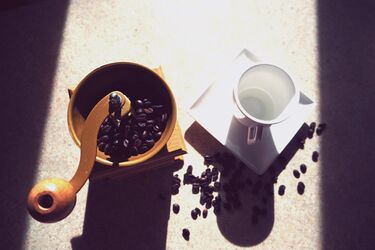Can strengthen concrete: scientists advise not to throw away coffee grounds

Australian scientists from RMIT University have discovered an unexpected property of coffee grounds that can make concrete 30% stronger. This discovery opens the way to solving the problems of two important areas: coffee waste utilization and the creation of an environmentally friendly building material.
Every year, the world produces about 10 billion kilograms of coffee waste, most of which ends up in landfills. Scientists claim that the use of coffee grounds in concrete production can be a solution to this problem. The results of their research are published in the Journal of Cleaner Production.
Previously: How to use coffee grounds in everyday life: 5 unique ways
RMIT University engineer Rajiv Roychand explains: "Disposal of organic waste poses an environmental problem because it emits large amounts of greenhouse gases. Our recipe can not only solve this problem, but also make the building material more durable."
One of the problems in the construction industry is the ever-increasing demand for resource-intensive concrete, which leads to a negative impact on the environment due to the extraction of natural sand. Ji Li, RMIT engineer, adds: "The ongoing extraction of natural sand has a major impact on the environment. We are looking for innovative ways to reduce this impact."
The team of scientists uses pyrolysis, the process of breaking down organic molecules under high temperature, to process coffee grounds. The result is biochar that can be incorporated into a cement matrix, providing strength to the building material.
Read also: 5 bad habits of coffee lovers that can shorten their lives
RMIT engineer Shannon Kilmartin-Lynch notes: "Our research is still in the early stages, but these discoveries offer an innovative way to significantly reduce the amount of organic waste that goes to landfill."
It is important to note that the researchers plan to expand their studies to other sources of organic waste, such as wood, food and agricultural waste.
As a reminder, we have already written what products should not be added to coffee.
If you want to get the latest news about the war and events in Ukraine, subscribe to our Telegram channel!
